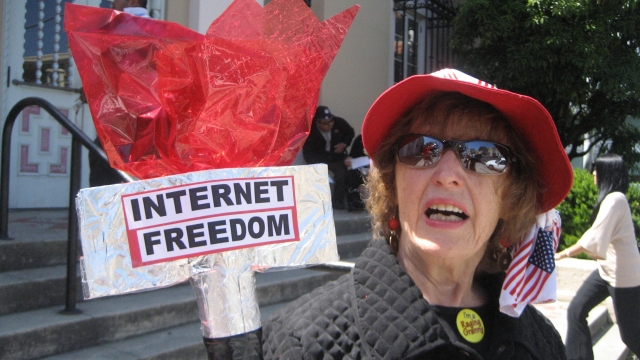Editor’s Note: Richard Fontaine, a Senior Advisor at the Center for a New American Security, is the co-author of Internet Freedom: A Foreign Policy Imperative in the Digital Age. Follow him @rhfontaine.
In its new “Enemies of the Internet” report, the international watchdog group Reporters Without Borders depicts an Internet under unprecedented pressure from the world’s autocratic regimes. The study lists twelve such “enemies,” including Iran, North Korea, China and Saudi Arabia, and observes that an increasing number of governments are not content merely to take domestic steps to control online space. “Freedom of expression on the Internet,” the study notes, “is no longer the sole preserve of dissidents, geeks and censors. Diplomats have followed in their wake.” Internet freedom has become a foreign policy issue.
The report documents the ways in which the twelve countries — and others — have established a broad approach to online control. Internet and mobile phone shutdowns have become more commonplace in recent years, famously in Egypt during the Arab Spring but also in countries like Kazakhstan and parts of China. Internet filtering and deep packet inspection is on the rise, and government surveillance of users’ activity — both online and offline — is increasing. Governments hack dissident websites, spread propaganda on the web, and sometimes simply arrest problematic bloggers and online activists.
It is clear what many autocratic regimes want in the Internet: a controlled space, one that ideally permits their citizens to use online tools for economic activity and basic communication, but that will not permit the kinds of expression that might undermine government authority. The effort to build such a controlled space is no longer restricted to domestic measures, and for several nations it now comprises a significant diplomatic effort.
Indeed, there are several diplomatic avenues through which Internet freedom may become restricted. FCC Commissioner Robert McDowell recently warned that dozens of countries are pursuing a new treaty to establish, in the words of Russian leader Vladimir Putin, “international control over the Internet.” The treaty would give governments new power to regulate the Internet via the UN’s International Telecommunications Union. If successful, McDowell warns, this effort could upend the bottom-up, private-sector-driven model of the Internet and give way to greater government control over its structure.
In addition, diplomats are wrestling over definitions of terms such as online “freedom” and “security” in ways that impact freedom of expression. At an April 2008 U.N. conference that sought to clarify what represents “aggression” online, for instance, a senior Russian official argued that “any time a government promotes ideas on the Internet with the goal of subverting another country’s government — even in the name of democratic reform — it should qualify as ‘aggression.’”
Similarly, the six-member Shanghai Cooperation Organization – which includes Russia and China – in 2009 adopted an accord that reportedly defined “information war,” in part, as an effort by a state to undermine another’s “political, economic and social systems.”
There is push back. A key United Nations official last year issued a major report emphasizing the right of all individuals freely to use the Internet, and earlier this month, the United Nations Human Rights Council held a Swedish-led discussion among member states on online freedom. These instances follow on initiatives by the United States and others to push in various international forums for an expansive definition of the right to online expression.
The United States and likeminded countries will need to become even more active on this front. Developing international norms in favor of Internet freedom is a long-term, global objective. Some countries that currently repress the Internet — like China and Iran — are unlikely to be moved by any of these diplomatic efforts; statements at the United Nations and policy declarations supporting Internet freedom are highly unlikely to change their current policies.
But promoting Internet freedom is not only a near-term challenge, and current efforts may pay off in the longer run. In addition, many countries have not yet fully developed their own Internet policies or thought through all of the implications of Internet freedom and repression even in the short run — including states in Central Asia, the Middle East and Africa. Shaping the behavior of those states should be an important goal of the United States and its partners.
Continued U.S. leadership is critical to fill what remains a normative vacuum. Part of the difficulty, however, lies not only with authoritarian regimes, but also with some key democracies as well. In addition to its 12 “enemies,” Reporters Without Borders listed several “countries under surveillance.” These include Australia, France and Turkey, democracies all. The United States will need to work with these and other democracies to find common ground that favors internet freedom.
This is not always an easy task, but the need for continued action is pressing. The United States should use all relevant diplomatic forums – the United Nations, the G8 and G20 meetings, and so on – to press for a liberal concept of Internet freedom, and to counter attempts by other states to adopt norms that would restrict expression online. Many autocracies now have an Internet agenda. Those nations who favor an expansive vision of Internet freedom should be equally vigorous in pressing their own.
Image credit: Freepress.net
